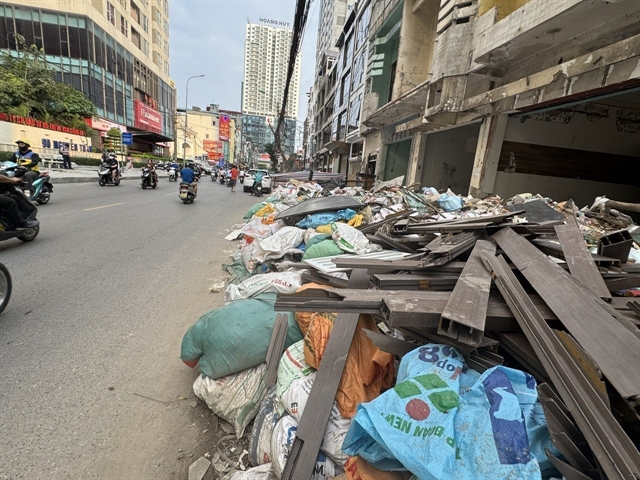 Environment
Environment

 |
| Garbage spilling onto Nguyễn Tuân Street in Hà Nội's Thanh Xuân District. — VNA/VNS Photo Quốc Lũy |
HÀ NỘI — Deputy Prime Minister Trần Hồng Hà has urged ministries, sectors and local authorities to take swift and decisive action to tackle worsening environmental pollution, particularly in Hà Nội and HCM City, where air and water pollution have reached alarming levels.
On Wednesday, the Deputy PM called for stricter enforcement of environmental laws at a meeting with key ministries and leaders of Hà Nội and HCM City to review a draft directive on urgent pollution control.
According to a report presented by the Ministry of Public Security, while Việt Nam has made notable progress in environmental protection, serious pollution persists in urban centres, industrial zones and densely populated areas, especially in terms of air quality, surface water and soil.
Every year, police forces uncover and handle more than 600 environmental crime cases and over 20,000 administrative violations. However, lax management and a lack of accountability at various levels have allowed the situation to worsen in many localities.
The Ministry of Public Security, which is leading the drafting of the new directive, said the document seeks to close legal loopholes, clarify the responsibilities of relevant agencies and enhance inter-agency coordination to root out polluting facilities.
Deputy Minister Nguyễn Văn Long said the directive seeks to boost local accountability and public engagement. The ministry has worked with Hà Nội authorities on urgent pollution response measures.
Minister of Agriculture and Environment Đỗ Đức Duy said the draft directive prioritises urgent solutions to address serious pollution in Hà Nội, particularly air and wastewater pollution, as well as contamination in craft villages and along river basins.
He said the ministry is finalising emissions standards for motorbikes and motorcycles, and has proposed specific responsibilities for the Ministry of Construction in controlling dust and emissions at construction sites. It has also called for the Ministry of Industry and Trade to manage emissions from thermal power plants, cement factories and steel production.
Deputy Chairman of the Hà Nội People’s Committee Dương Đức Tuấn agreed with the direction of the draft, outlining the city’s plan to gradually reduce fossil fuel-powered vehicles and urging the inclusion of measures to mitigate other pollution sources, such as construction, agriculture, waste treatment and traditional craft villages. He also called for clearer delineation of the city’s role in declaring environmental emergencies and building an air monitoring network.
HCM City's People's Committee DeputyChairman Bùi Xuân Cường said the city would focus on implementing key tasks under the directive, including developing a water resource monitoring system, automatic air monitoring stations and identifying low-emission zones.
He proposed greater decentralisation to empower local-level authorities, especially communes and wards, to enforce environmental laws more effectively.
Cường also called for the establishment of a unified national environmental information system, and greater support for residents and businesses to adopt green transport and cleaner production technologies.
In his closing remarks, Deputy PM Hà urged ministries and local authorities to finalise the pollution directive with clear targets for Hà Nội, HCM City and other urban areas.
He called for specific environmental standards, stronger enforcement and better monitoring.
Ministries were told to act immediately, hold localities accountable and encourage private investment in environmental protection.
He urged Hà Nội and HCM City to take the lead by developing their own action plans adapted to local conditions, and to move swiftly to reduce pollution and protect public health. — VNS